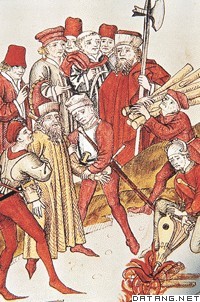1) heretic writer


异端作家
2) heresy
[英]['herəsi] [美]['hɛrəsɪ]


异端
1.
Confucius "heresy" theory is an integral part of his mean thinking,and represents Confucius tolerance on the basis of in-depth understanding of heresy.
孔子的"异端"说是其"中庸"思想的一个有机组成部分,表现了孔子对异端建立在深度理解基础之上的宽容。
2.
Li Zhi is well-known as "the heresy" for his rebellious disposition in Min Dynasty.


李贽是晚明时期以反叛性格闻名于当时的“异端”。
3.
Therefore,he is known as a "heresy" in the world.


李贽追求个性自由和真性情,反对理学对思想的禁锢和个性的扼杀,他的社会思想,政治见解与统治者相抵触,与理学家相冲突;他愤世嫉俗,与现实格格不入,以“异端”著称于世。
3) heterodoxy
[英]['hetərədɔksi] [美]['hɛtərə,dɑksɪ]


异端
1.
The Heterodoxy of Aesthetics: Research on the Category of "Kuang" in Chinese Classical Literary Theory;
审美的异端:中国古代文论“狂”范畴之浅探
2.
Though there were some differences towards the so-called heterodoxy,their progressive thoughts made a deep impact on the successors.
同时由于个性差异与生活经历的不同,他们在异端承受之勇气方面,一个犹恐人"病我"、一个则自甘为"异端",表现出迥然的心理差异,呈现出文化样态的复杂多元性。
3.
Lu Xun always played the role of “Odd Owl” in the society of his time, and posed as a figure of heterodoxy.
在当时的社会 ,鲁迅常以“异端”的姿态充当着“怪鸱”的角色。
4) Writer
[英]['raɪtə(r)] [美]['raɪtɚ]


作家
1.
Good Writers Not From Literature——Some Opinions about General Education;


作家少读中文系——关于通识的思考札记之一
2.
On Spiritual Value Orientation of the Writers in Different Dynasties;


纵论历代作家精神价值取向
3.
A Writer Who Changed His Profession: Mayor Li Jieren's Dilemma in Search of His Identity in a New Society, 1950-1962;
“改行的作家”:市长李劼人角色认同的困窘,1950—1962
5) writers
[英]['raitə] [美]['raɪtɚ]


作家
1.
Because of the historical and cultural factors and the lack of influence of Chinese traditional culture,the Chinese contemporary writers look down on Chinese classical literature,and neglect even refuse the narrative spirit in it.
由于历史和文化的原因,当代作家普遍缺乏中国传统文化精神的薰染,致使当代作家对中国古典文学传统不屑一顾,也对中国文学中的叙事精神普遍淡漠甚至拒绝,最后导致价值缺失,精神漂泊。
2.
It is this fresh air that causes the writers with various writing styles to form the same writing tendency in particular period and has an influence in the trend of Chinese literature in 1990s.
正是这种清醒的气息使风格各异的作家们在特定的时期内形成了相同的创作倾向并影响了中国文学在20世纪90年代的走向。
6) Author
[英]['ɔ:θə(r)] [美]['ɔθɚ]


作家
1.
On the freedom and non-freedom of the author and critic;


文学活动中作家与批评家的自由与不自由
2.
The Additions and Corrections to Qingren Shiwenji Zongmu Tiyao ——focus on the authors of Wulin Fangxiangzhi;
《清人诗文集总目提要》订补——以《武林坊巷志》所涉作家为中心
3.
The fiction of Su Tong, a young author, has aroused a lot of attention.


年轻作家苏童的小说引起人们的广泛关注。
补充资料:基督教异端派别
| 基督教异端派别 Christianity,Heretical Sects of 在神学观点上与占统治地位的基督教正统理论相左因而受到当时教会权威排斥的基督教派别。关于异端的概念和理论以及对异端的排斥谴责主要出现于古代和中世纪。在近现代,由于理性主义的影响以及宗教宽容与信仰自由原则的深入人心,同时由于基督教普世合一运动的出现和发展,对于异端的理解已发生了很大变化。一般说来,现代基督教在接受本派教义的同时,不再把持其他观点的基督徒斥为异端。基督教历史上的异端大致可按其出现的时期分为古代异端和中世纪异端两大类。
古代判别异端与正统的标准,主要来自圣经中先知和使徒的言论。后来教会开始通过公会议来确定正统,斥责异端,并以编定新约正典、公布信经的形式,把正统信仰和教义固定下来。在早期的罗马教会中,形成惯例的做法是正统教义须由教皇批准。古代被斥为异端的教派包括基督教诺斯替派、马西昂派、孟他努派、阿里乌派、阿波利拿里派、聂斯托利派、一性论派、贝拉基主义、多纳图派等等。 中世纪的异端概念已不限于教义方面的错误,还包括基督徒生活与操持方面的“错误”。12~13世纪,为了对付异端,天主教建立了异端裁判所,并把受到审判而又不肯公开认错的异端分子交给世俗当局惩处,有时还发动十字军讨伐异端。宗教改革后很长时期之内,天主教会仍保留过去关于异端的理论,对异端仍予以谴责,新教各派则认为自己所持的信仰是真理,视其他派别为异端。中世纪异端包括一意论派、保罗派、鲍格米勒派、阿尔比派、韦尔多派、鞭笞派、罗拉德派、胡斯派、旧礼仪派、杜霍波尔派等等。基督教世界的政教逐渐分离之后,基督教各派对异端的强制制裁逐渐消失。 |
说明:补充资料仅用于学习参考,请勿用于其它任何用途。
参考词条
 专业词汇(按中图法分类)
专业词汇(按中图法分类)
